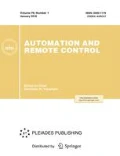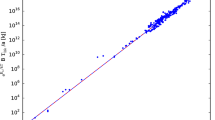Abstract
Effect of dietary restriction on extended lifespan for various living organisms is examined. The fact that lifespan increases with moderate dietary restriction and the increase is determined by diet components, not the calorie content is noted. The following hypothesis is considered: change in the lifespan under dietary restriction is related to transition of the organism to the nonsteady state when control processes become activated for recovery to the stationary state. The energy expenditures for reproduction decreases, metabolism alteration sets in, and the substrate yield goes up. The extended life span observable in a number of cases may be a collateral result of these processes. Simulated results that confirm these inferences have been obtained.
Similar content being viewed by others
References
Anisimov, V.N., Priority Areas of Fundamental Research in Gerontology: Russia’s contribution, Usp. Gerontol., 2003, vol. 12, pp. 9–27.
Novoseltsev, V.N., Teoriya upravleniya i biosistemy. Analiz sokhranitel’nykh svoistv (Control Theory and Biosystems. Analysis of Protective Properties), Moscow: Nauka, 1978.
Novoseltsev, V.N., Population Risk Analysis Based on Physiology Models, Sb. Tr. Inst. Probl. Upravlen., 1996, no. 3, pp. 63–77.
Novoseltsev, V.N., Arking, R., Novoseltseva, Zh.A., and Yashin, A.I., Interdisciplinary Modeling of Systemic Mechanisms for Reproduction and Aging Control, Probl. Upravlen., 2004, no. 4, pp. 27–40.
Novoseltsev, V.N. and Novoseltseva, Zh.A., Dietary Restriction Extends Lifespan in Sterile and Non-Sterile Female D. melanogaster. System-Defined Analysis, Usp. Gerontol., 2010, vol. 23, no. 2, pp. 185–196.
Novoseltsev, V.N., Uvelichenie prodolzhitel’nosti zhizni i usloviya sredy: matematicheskoe modelirovanie. Issledovatel’skii proekt (Extended Lifespan and Environmental Conditions: Mathematical Modeling. Research Project), Moscow: Fond “Nauka za Prodlenie Zhizni,” 2010.
Ugolev, A.M., Estestvennye tekhnologii biologicheskikh sistem (Natural Technologies of Biological Systems), Leningrad: Nauka, 1987.
Broughton, S. and Partridge, L., Insulin/IGF-like Signalling, the Central Nervous System and Aging, Biochem. J., 2009, vol. 418, pp. 1–12.
Chapman, T. and Partridge, L., Female Fitness in Drosophila Melanogaster: An Interaction between the Effect of Nutrition and Encounter Rate with Males, Proc. Roy. Soc. Lond., 1996, vol. 263, pp. 755–759.
Carey, J.R., Private message.
Cheng, Ch.-L., Gao, T.-Q., Wang, Z., and Li, D.-D., Role of Insulin/Insulin-like Growth Factor 1 Signaling Pathway in Longevity, World J. Gastroenterol., vol. 11, pp. 1891–1895.
Chippindale, A.K., Leroi, A.M., Kim, S.B., and Rose, M.R., Phenotypic Plasticity and Selection in Drosophila Life-History Evolution. I. Nutrition and the Cost of Reproduction, J. Evol. Biol., 1993, vol. 6, pp. 171–193.
Davies, S., Kattel R., et al., The Effect of Diet, Sex, and Mating Status on Longevity in Mediterranean fruit flies (Ceratitis Capitata), Di ptera. Tephritidae, Exp. Gerontol., 1996, vol. 40, pp. 784–792.
Good, T.P. and Tatar, M., Age-Specific Mortality and Reproduction Respond to Adult Dietary Restriction in Drosophila melanogaster, J. Insect. Physiol., 2001, vol. 47, pp. 1467–1473.
Guyton, A., Textbook on Medical Physiology, Philadelphia: W.B. Saunders, 1981, 6th ed.
Harman, D., Aging: A Theory Based on Free Radical and Radiation chemistry, J. Gerontol., 1956, vol. 11, pp. 298–300.
Hwangbo, D.S., Gersham, B., Tu, M.-P., et al., Drosophila dFOXO Controls Lifespan and Regulates Insulin Signalling in Brain and Fat Body, Nature, 2004, vol. 429, pp. 562–566.
Kapahi, P., Zid, B.M., Harper, T., et al., Regulation of Lifespan in Drosophila by Modulation of Genes in the TOR Signaling Pathway, Curr. Biol., 2004, vol. 14, pp. 885–890.
Kirkwood, T.B.L. and Rose, M.R., Evolution of Senescence—Late Survival Sacrificed for Reproduction, Phil. Trans. R. Soc. Lond., 1991, vol. B332, pp. 15–24.
Le Bourg, E. and Minois, N., Failure to Confirm Increased Longevity in Drosophila melanogaster Submitted to a Food Restriction Procedure, J. Gerontol. A, Biol. Sci., 1996, vol. 6, pp. B280–B283.
Le Bourg, E. and Medioni, J., Food Restriction and Longevity in Drosophila melanogaster, Age Nutr., 1991, vol. 2, pp. 90–94.
Lee, K.P., Simpson, S.J., Glissold, F.J., et al., Lifespan and Reproduction in Drosophila: New Insights from Nutritional Geometry, PNAS, 2008, vol. 105, pp. 2498–2503.
Mair, W., Goymer, P., Pletcher, S.D., and Partridge, L., Demography of Dietary Restriction and Death in Drosophila, Science, 2003, vol. 301, pp. 1731–1733.
Mair, W., Pi, per M.D.W., and Partridge, L., Calories Do Not Explain Extension of Life Span by Dietary Restriction in Drosophila, PloS Biol., 2005, vol. 3, pp. 1305–1311.
Mair, W., Sgro, C.M., Johnson, A.P., et al., Lifespan Extension by Dietary Restriction in Female Drosophila melanogaster Is Not Caused by a Reduction in Vitellogenesis or Ovarian Activity, Exp. Gerontol., 2004, vol. 39, pp. 1011–1019.
Novoseltsev, V.N., Carey, J., Liedo, P., et al., The Reversal of Aging in Virgin Female Fruit Flies: An Anticipation of Oxidative Damage Hypothesis, Exp. Gerontol., 2000, vol. 35, pp. 971–987.
Novoseltsev, V.N., Novoseltseva, J.A., and Yashin, A.I., A Homeostatic Model of Oxidative Damage Explains Paradoxes Observed in Earlier Aging Experiments: A Fusion and Extension of Older Theories of Aging, Biogerontol., 2001, vol. 2, pp. 127–138.
O’Brien, D.M., Min, K.-J., Larsen, T., and Tatar, M., Use of Stable Isotopes to Examine How Dietary Restriction Extend Drosophila Lifespan, Curr. Biol. Mag., 2006, vol. 18, pp. R155–156.
Partridge, L., Gems, D., and Withers, D.J., Sex and Death: What Is the Connection?, Cell, 2005, vol. 120, pp. 461–472.
Pletcher, S.D., Macdonald, S.J., Marguerie, R., et al., Genome-Wide Transcript Profiles in Aging and Calorically Restricted Drosophila, Curr. Biol., 2002, vol. 12, pp. 712–723.
Scorupa, D.A., Dervisefendic, A., Zweiner, J., and Pletcher, S.D., Dietary Composition Specifies Consumption, Obesity, and Lifespan in Drosophila melanogaster, Houston: Aging Cell, 2008.
Author information
Authors and Affiliations
Additional information
Original Russian Text © V.N. Novoseltsev, Zh.A. Novoseltseva, 2011, published in Problemy Upravleniya, 2011, No. 2, pp. 60–68.
Rights and permissions
About this article
Cite this article
Novoseltsev, V.N., Novoseltseva, Z.A. Dietary restriction and lifespan: Control and modeling. Autom Remote Control 74, 1412–1423 (2013). https://doi.org/10.1134/S0005117913080171
Received:
Published:
Issue Date:
DOI: https://doi.org/10.1134/S0005117913080171




